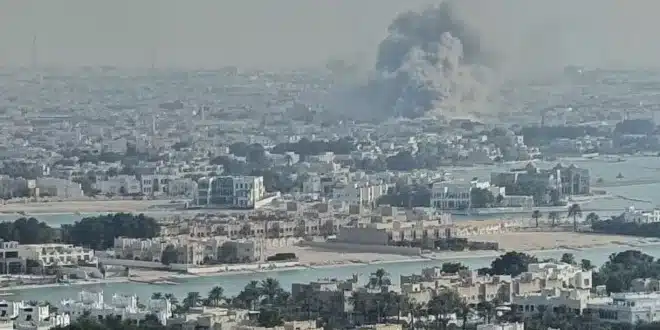The small but strategically important state of Qatar—home to the largest U.S. military base in the Middle East—has long prided itself on its role as a mediator in global conflicts. It has hosted tens of thousands of evacuated Americans from Afghanistan, been named a major non-NATO U.S. ally, and even provided a $400 million aircraft for use as Air Force One. Yet those close ties did not shield the peninsula this week when Israel launched an aerial strike in its capital, Doha, as Qatari officials mediated U.S.-backed ceasefire talks between Israel and Hamas.
The strike targeted a meeting of Hamas’ political leadership in exile, sending smoke over a city better known for its luxury malls and World Cup stadiums than for military conflict. It marked a stark escalation: while Israel has pursued Hamas leaders abroad since the October 7, 2023, attacks, it had previously avoided striking inside Qatar, a U.S. partner and key back channel to the Palestinian group. Analysts warn the decision may backfire, disrupting ceasefire efforts and raising doubts about the reliability of U.S. guarantees to its Gulf allies.
Qatar’s Position Undermined
Qatar has hosted Hamas’ political office since 2012 with tacit U.S. approval, part of Washington’s strategy to keep indirect communication channels open with a group it designates as a terrorist organization. By accommodating Hamas and other groups such as the Taliban, Qatar built influence as a mediator in regional conflicts, assuming its close ties with Washington and the presence of Al Udeid Air Base would shield it from attack.
That assumption was shattered when Israeli strikes landed in central Doha. The U.S. later confirmed it was informed by Israel in advance, but Qatari officials said they only received notice as the bombs were falling. The breach of sovereignty stunned Qatari leaders, who had believed their partnership with Washington offered protection.
Shockwaves Across the Gulf
The incident reverberated across the Gulf states, where governments—despite past differences with Qatar—quickly rallied in support. Anwar Gargash, adviser to the UAE leadership, declared, “The security of the Arab Gulf states is indivisible, and we stand heart and soul with the sisterly Qatar, condemning the treacherous Israeli attack.”
The strike also deepened existing doubts about the U.S. as a dependable security partner. Gulf nations such as the UAE and Saudi Arabia have already sought to diversify their alliances, strengthening ties with China and Russia. Analysts suggest Israel’s actions could accelerate this trend, pushing Gulf leaders further from Washington’s orbit.
Significantly, Gulf states—though deeply opposed to Hamas’ Islamist ideology—now see Israel’s aggressive campaign as destabilizing, perhaps even more dangerous to their fragile security than Iran. As one analyst noted, “Traditionally Iran was seen as the main threat. Now, it is Israel’s unchecked military actions that unsettle the region.”
Implications for Regional Diplomacy
The fallout is especially damaging for Israel’s efforts to expand the Abraham Accords, which normalized ties with the UAE, Bahrain, and others in 2020. Before the current conflict, Saudi Arabia was weighing similar steps. But Israel’s prolonged campaign in Gaza and its strikes beyond the territory have hardened Saudi conditions, with Riyadh now insisting on Palestinian statehood before any normalization.
“This effectively ends hopes for new Gulf partners,” one regional analyst observed. “How can Arab states normalize with a country that bombs one of their own?”
Ceasefire Efforts in Jeopardy
Doha has been central to ongoing ceasefire negotiations aimed at halting the war and securing the release of Israeli hostages. The Hamas leaders targeted in the strike were reportedly discussing a U.S.-backed plan for Hamas to release 48 hostages, 20 of whom are believed still alive.
Following the attack, Qatari Prime Minister Shaikh Mohammed bin Abdulrahman Al Thani questioned whether it was even worth continuing talks. Meanwhile, Israeli Prime Minister Benjamin Netanyahu, under pressure from far-right allies, has pressed ahead with plans for a fresh ground offensive in Gaza—moves likely to imperil both the hostages and Palestinian civilians.
A Dangerous Message
For many in the Gulf, Israel’s strike was not just about Hamas but a signal to the entire region: that Israeli military dominance will continue, even at the expense of fragile diplomatic arrangements. As Sanam Vakil of Chatham House put it, “The attack was a message not just to Hamas but to the region. Military pressure will continue, with Washington seeing Israeli dominance as effective.”
In one strike, Israel not only rattled its enemies but also unsettled its allies—casting new doubt on the future of Gulf security, regional diplomacy, and the U.S.’s role as guarantor in a volatile Middle East.


